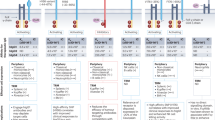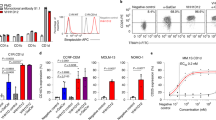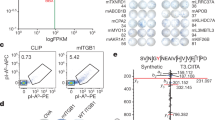Abstract
Antibody-dependent cellular cytotoxicity (ADCC) is considered to be the major mechanism through which tumour cells, upon treatment with anti-tumour MAbs, are eliminated in vivo. However, the relative importance of various parameters that influence the efficacy of ADCC is unclear. Here we present in vitro data on the impact of MAb affinity and antigen density on ADCC, as obtained by comparison of two MAbs against the tumour-associated antigen Ep-CAM. The low-affinity MAb 17-1A (Ka = 5 x 10(7)M(-1)) currently used for therapy, and the high-affinity MAb 323/A3 (Ka = 2 x 10(9) M(-1)), were compared in ADCC experiments against murine and human tumour target cells transfected with the Ep-CAM cDNA under the control of an inducible promoter to enable regulation of the target antigen expression levels. Data obtained from these studies revealed that the high-affinity MAb, in contrast to the low-affinity MAb, could mediate killing of tumour cells with low antigen expression levels. Even at comparable MAb-binding levels, ADCC mediated by the high-affinity MAb was more effective. The kinetics of ADCC was also found to be determined by the level of antigen expression, and by the affinity and the concentration of the MAb used. The efficacy of ADCC with both low- and high-affinity MAbs further depended on adhesive interactions between effector and target cells mediated by CD18. However, at every given MAb concentration these interactions were of less importance for the high-affinity MAb than for the low-affinity MAb. As heterogeneity of a target antigen expression is a common feature of all tumours, and some tumour cells express very low levels of the antigen, the use of high-affinity MAbs in immunotherapy may significantly improve the clinical results obtained to the present date in the treatment of minimal residual disease.
This is a preview of subscription content, access via your institution
Access options
Subscribe to this journal
Receive 24 print issues and online access
$259.00 per year
only $10.79 per issue
Buy this article
- Purchase on Springer Link
- Instant access to full article PDF
Prices may be subject to local taxes which are calculated during checkout
Similar content being viewed by others
Author information
Authors and Affiliations
Rights and permissions
About this article
Cite this article
Velders, M., van Rhijn, C., Oskam, E. et al. The impact of antigen density and antibody affinity on antibody-dependent cellular cytotoxicity: relevance for immunotherapy of carcinomas. Br J Cancer 78, 478–483 (1998). https://doi.org/10.1038/bjc.1998.518
Issue Date:
DOI: https://doi.org/10.1038/bjc.1998.518
This article is cited by
-
Modelling ligand depletion for simultaneous affinity and binding site quantification on cells and tissue
Scientific Reports (2023)
-
Comparison of Anti-Trop2 Extracellular Domain Antibodies Generated Against Peptide and Protein Immunogens for Targeting Trop2-Positive Tumour Cells
Applied Biochemistry and Biotechnology (2023)
-
Efficacy and mechanism of the anti-CD38 monoclonal antibody Daratumumab against primary effusion lymphoma
Cancer Immunology, Immunotherapy (2022)
-
Elotuzumab, a potential therapeutic humanized anti-SLAMF7 monoclonal antibody, enhances natural killer cell-mediated killing of primary effusion lymphoma cells
Cancer Immunology, Immunotherapy (2022)
-
A BCMA/CD16A bispecific innate cell engager for the treatment of multiple myeloma
Leukemia (2022)



